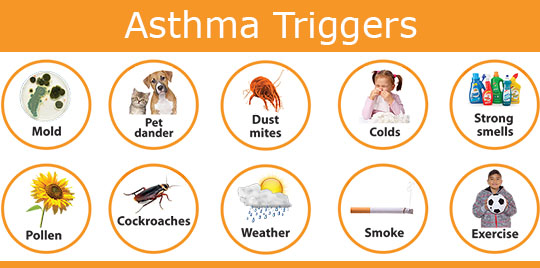If you have asthma, your airways are more inflamed than those without this condition and an essential part of being able to manage your asthma is to identify what your triggers are. An asthma trigger can be anything that sets off your symptoms from a substance, an activity or even emotions.
Manage Your Asthma by Identifying Triggers
Triggers differ from one person to the next but paying attention to how and when your asthma occurs can help you avoid substances and habits that may induce attacks.
Common triggers of asthma
Asthma is largely an allergic disease[1]. If you’re exposed to potential allergens, you may experience more frequent episodes of asthma.
The most common causes and triggers of asthma[2] are: infections like colds or flu-like symptoms, especially with cough; allergies to dust, pollen, dust mites, or animal feather; allergies to certain medications; food allergies, such as allergies to nuts, gluten, seafood, and others; allergic rhinitis; strong scents such as perfumes or those from chemicals; cigarette smoke; smoke from vehicles, pollution, and fumes; emotions such as too much stress, or fear; exhaustion and tiredness; changes in weather such as suddenly experiencing too much heat, humidity, and cold weather; extremely dry or extremely humid air; alcoholic drinks and some types of wine; food additives and preservatives; molds and fungi; poor quality indoor air; and some home cleaning products, shampoos and soaps, and other shower items and cosmetics
Work-related asthma
In addition to these triggers, asthma may be associated with substances you’re exposed to at work[3]. This is termed occupational or work-related asthma.
For instance, you may be exposed to these substances: isocyanates[4] (found in spray paint); food ingredients such as flour or those with strong scents such as powdered condiments; Latex[5] ; animals; wood dust; colophony (found in solder fumes)[6] or artificial air fresheners and aerosol chemicals[7] (such as in laboratories, hair salons, or factories)
 Those who have a high risk of being exposed to asthma-inducing chemicals at work[8] include construction workers, bakers and cooks, nurses, chemical workers, hair stylists, food processing workers, and welders.
Those who have a high risk of being exposed to asthma-inducing chemicals at work[8] include construction workers, bakers and cooks, nurses, chemical workers, hair stylists, food processing workers, and welders.
Your asthma symptoms may start after weeks, months, or even years of exposure to these substances. Some individuals who do not have a history of asthma may even start developing the disease. But once your airways become sensitive to these substances, even exposure to little amounts can potentially be extremely harmful. In such cases, the best way to avoid asthma is to get away from the trigger.
How to manage asthma after identifying your triggers
After you’ve identified your triggers, here are eight tips that will help you manage your asthma:
1. Consult your allergologist or pulmonologist to evaluate all other possible allergies to food, substances, and medicines.
2. Try to avoid being exposed to your triggers. Wear a face mask when you’re outdoors.
3. If you’re a smoker, immediately stop smoking. If you have friends or family members who smoke, and you mingle with them closely on a regular basis, encourage them to stop smoking as well.
4. Clean your home regularly to remove potential allergens.
5. Always take your doctor-prescribed rescue inhaler. Invest in a nebulizer.
6. Keep your immune system strong to ward off infections from bacteria and viruses.
7. If you’re often tired and stressed, make sure to get enough rest. Practice breathing techniques and meditation exercises to reduce stress and anxiety.
8. Engage in physical activities with caution.
Lastly, consult your doctor regularly if you have asthma. As symptoms and triggers may change seasonally, you and your doctor must carefully study your history and symptoms and create a management plan that suits your lifestyle.
***Note that this article does not serve as professional medical advise, diagnosis or treatment. Always seek the advise of your doctor or other qualified health provider with any questions you may have regarding your medical condition.
[1]Mayo Clinic. Allergies and asthma: Double trouble. Reference: https://www.mayoclinic.org/
[2] American College of Allergy, Asthma, and Immunology. Asthma treatment. Reference: https://acaai.org/asthma/
Mayo Clinic. Asthma attack. Reference: https://www.mayoclinic.org/
[3]NHS. Causes of Asthma. Reference: https://www.nhs.uk/conditions/
[4] Yale School of Medicine. Isocyanates and Asthma. Reference: https://medicine.yale.edu/
[5]American College of Allergy, Asthma, and Immunology. Latex Allergy. Reference: https://acaai.org/allergies/
[6]Occupational Asthma. Colophony (Solder). Reference: http://www.occupationalasthma.
[7]Time. New Study Indicates That Air Fresheners Can Trigger Respiratory Problems. Reference: http://healthland.time.com/
[8] Asthma.org.uk. Occupational asthma. Reference: https://www.asthma.org.uk/

